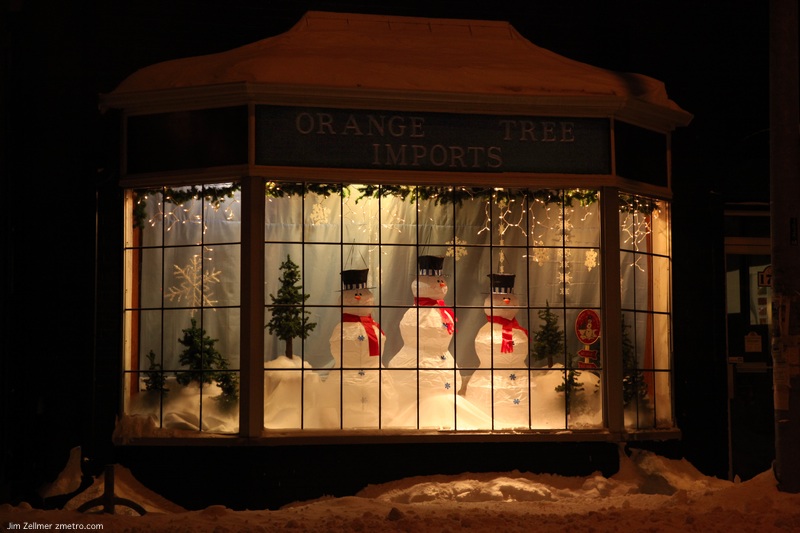Wisconsin Men’s Hockey vs Lake Superior State from Jim Zellmer.
Sunday evening’s Badger Hockey Showdown championship between the Wisconsin Men’s hockey team and the Lake Superior State Lakers produced an interesting outcome: a shootout after an inconclusive overtime.
Monthly Archives: December 2008
The Marshfield Clinic’s Electronic Medical Records System in the News
Joseph Calderaro, 67, is one of health care’s quiet success stories. Over the last four years, he has carefully managed his diabetes by lowering his blood sugar, blood pressure and cholesterol with diet, exercise and medication.
To keep on track, Mr. Calderaro visits his doctor, attends meetings for diabetes patients and gets frequent calls from a health counselor. It is a team effort, orchestrated by the Marshfield Clinic here. And it is animated by technology, starting with Mr. Calderaro’s computerized patient record — a continuously updated document that includes his health history, medications, lab tests, treatment guidelines and doctors’ and nurses’ notes.
To visit the Marshfield Clinic, a longtime innovator in health information technology, is to glimpse medicine’s digital future. Across the national spectrum of health care politics there is broad agreement that moving patient records into the computer age, the way Marshfield and some other health systems have already done, is essential to improving care and curbing costs.
There has been some loose talk about the Obama administration providing “incentives” for health care automation. These investments should be made on their merits, rather than funded by yet another taxpayer give-away.
Marshfield apparently built their own system, a competitor to Verona based Epic Systems.
Might this article be part of their initial marketing efforts to other health care organizations?
Milwaukee’s Eisner Museum of Advertising & Design
Current exhibits include: “Ads from the past: Coca Cola”. This fascinating museum is a gem in Milwaukee’s Third Ward, and at $5.00 a bargain as well.
Year in Pictures: 2008
On the Fed Printing Money
It is a sorry place at which we Americans find ourselves this none-too-festive holiday season. The biggest names on Wall Street have gone to their rewards or into partnership with the U.S. Treasury. Foreigners stare wide-eyed from across the waters. A $50 billion Ponzi scheme (baited with, of all things in this age of excess, the promise of low, spuriously predictable returns)? Interest rates over which tiny Japanese rates fairly tower? Regulatory policy seemingly set by a weather vane? A Federal Reserve that can’t make up its mind: Is it in the business of central banking or of central planning? And to think — our disappointed foreign friends mutter — all of these enormities taking place under a Republican administration.
Trust itself entered a bear market in 2008, complementing and perhaps surpassing the selloffs in stocks, mortgages and commodities. Never to be confused with angels, we humans seem to outdo ourselves when money is on the line. So it is that Bernard Madoff, supposed pillar of the community, stands accused of perpetrating one of the greatest hoaxes since John Law discovered the inflationary possibilities of paper money in the early 18th cent
Snowmen Watching Over Madison’s Monroe Street
Christmas Lights in the Big Apple

Photo taken from the back seat of a cab on a recent New York City evening.
The Year in Business: 2008
Party of the year: The $86,000 partridge-hunting trip funded by AIG, a government-rescued insurance firm, for some top clients. They had fun, but the public outcry was such that lots of other firms cancelled their holiday parties lest they be accused of wasting money in tough times. Cheers!
Badly-timed nickname: Awarded jointly to Whole Foods Market and Starbucks. Being known, respectively, as Whole Paycheck and Fourbucks is fine when the going is good, but not when consumers are obsessed with value for money. Both of these pricey retailers have had a miserable year. Whole Foods’ shares are down by 75% so far in 2008, and shares in Starbucks are down by over half.
In memoriam: A posthumous award for this year’s notable departures. Contenders include Alan Greenspan’s reputation as a great central banker; investment banks; the newspaper industry; sport-utility vehicles; fiscal prudence; the inexorable rise of BRIC economies and the theory that BRICs had “decoupled” from rich world economies; pay increases; and capitalism. But the winner is economic growth—gone, though one hopes not forever.
iPod Breathalyzer
Now the iPod can answer the question: Am iDrunk?
A new product called the iBreath turns Apple Inc.’s iPod into an alcohol breathalyzer.
The $79 accessory plugs into the base of the iPod and functions like a field sobriety test. The person using the iBreath exhales into a retractable “blow wand” and the internal sensor measures the blood-alcohol content. Within two seconds, it displays the results on an LED screen. A reading of 0.08 or above sets off an alarm, signaling a blood-alcohol level above the legal limit in all 50 states.
“We are absolutely not advocating drinking and driving, but we know that people just don’t observe that,” said Don Bassler, chief executive and founder of David Steele Enterprises Inc. in Newport Beach, an online retailer and creator of the iBreath. “We don’t want people to think that this makes it all OK, but it’s a safety device that we hope people will use, and it may save lives.”
The iBreath is among a growing number of products for the iPod and iPhone designed to combat excessive holiday reveling. Last Call, a new application for the iPhone, provides a tool for estimating blood-alcohol content (as well as a list of attorneys who specialize in DUI arrests).
Fascinating.
Christmas Scene


